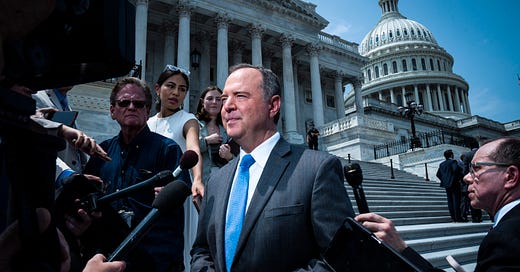This Democracy Defender Has Trump’s Number
California’s Adam Schiff, running for the U.S. Senate, is unusually well suited for the fight to contain Trump and Russia.

FEW CANDIDATES FIT A MOMENT as well as Rep. Adam Schiff fits this one.
The California Democrat is known best, and reviled in MAGA quarters, for his lead role in the first Donald Trump impeachment inquiry and trial, and as a member of the House January 6th Committee. House Republicans have censured him and banished him from the Intelligence Committee he used to chair. Trump calls him “pencil neck.”
Schiff treats all that as a “badge of honor” and is aiming for a promotion to the Senate. Polling strongly suggests he’ll finish in the top two in Tuesday’s all-party primary and advance to the November ballot. The field also includes House Democrats Barbara Lee and Katie Porter, and Republican Steve Garvey, a onetime professional baseball star, a two-time Trump voter, and a first-time political candidate.
What is the case for Schiff? The multiply indicted Trump’s glide path to his third presidential nomination presents the United States with existential threats to both national security and—as he and his loyalists scheme to break and control courts, elections, the federal bureaucracy, Congress, the military, state officials and legislatures, local election authorities, and the global order—political stability. Under these circumstances, Schiff’s expertise on Russia, Ukraine, and the fight to preserve American democracy makes him a unique resource.
In 1990, a decade before he won his House seat, Schiff—then a U.S. attorney—notched an unusual resume entry: He successfully prosecuted Richard Miller, the first FBI agent ever accused and convicted of espionage. Miller’s first trial had ended in a mistrial and his conviction in a second trial was reversed on appeal. Schiff, assigned to lead the third prosecution in 1990, won a conviction that stuck. He also got an education in Russian intelligence methods and the workings of the FBI.
“I learned a lot about Russian tradecraft: how the Russians operate, who they target, the vulnerabilities they look for,” Schiff told Politico in 2019. “They want people with access to information that is of use to them. They look for people who are sort of at the margins at what they do, that have financial problems, who have marital problems that they can exploit. And they found a very good target with Richard Miller.”
Schiff has been appropriately central to investigations of Russian interference in the 2016 election, an aggressive counterpuncher on Trump’s false claims of “total exoneration” and “no collusion” with Russia, a staunch democracy defender through both Trump impeachments, and an eerily accurate prophet of doom on Trump’s recidivist trajectory.
‘Censure all of us’
IN A STRIKING OBSERVATION LAST WEEK, historian Heather Cox Richardson wrote that “the more I think about it, the more it seems the main story of the past decade has been Russian disinformation to undermine U.S. democracy.” Think back to five years ago: Special Counsel Robert Mueller’s investigation documented that Trump and his campaign welcomed Russian meddling on his behalf, and identified “numerous links between the Russian government and the Trump Campaign.” The list of travesties, in that report and ever since, is long and growing.
A tiny sampling: In his first campaign, Trump lied about having no ongoing business with Russia and, the Treasury Department said definitively in 2021, his campaign “provided the Russian Intelligence Services with sensitive information on polling and campaign strategy.” In his first spring as president, Trump revealed highly classified intelligence to the Russian ambassador and foreign minister in the Oval Office. In 2019 he made his “perfect” blackmail call to Ukraine President Volodymyr Zelensky, requesting a “favor”—dirt on Joe Biden—in exchange for military aid Congress had already appropriated for Ukraine. He was impeached and acquitted, despite Schiff’s best efforts.
“You can’t trust this president to do the right thing, not for one minute, not for one election, not for the sake of our country. You just can’t. He will not change, and you know it,” Schiff told the Senate in his closing impeachment trial argument on February 3, 2020.
He has betrayed our national security, and he will do so again. He has compromised our elections, and he will do so again. You will not change him. You cannot constrain him. He is who he is. Truth matters little to him. What’s right matters even less. And decency matters not at all.
Eleven months later, as Congress tried to count state-certified electoral votes and finalize Joe Biden’s win, Trump loyalists stormed the Capitol and staged a deadly riot—the violent face of Trump’s multifaceted, multistate attempt to overturn the results and stay in office. He did leave, but took with him to Mar-a-Lago highly sensitive classified documents that the FBI had to recover using a search warrant.
Compromising elections, check. National security betrayal, check.
Clearly, all this conspicuous rightness had to be punished, and Republicans, after winning a tiny majority in the House, did so by censuring Schiff in 2023. Rep. Jamie Raskin of Maryland ridiculed their censure motion, which conflates conspiracy (a legal term) with collusion (an opinion, in this case backed up by many examples). “Most Americans would see a lot of collusive activity” between Trump and Russia, Raskin said, from the 2016 campaign “all the way up to the present day when Donald Trump refuses even to take the side of the Ukrainian people against Vladimir Putin’s filthy, bloody, imperialist invasion of their country.”
“Censure all of us!” an outraged Democrat shouted on the floor.
Schiff embraced his new place in history as the twenty-fifth member ever censured. “To my Republican colleagues who introduced this resolution, I thank you. You honor me with your enmity. You flatter me with this falsehood,” he said. “You, who are the authors of a big lie about the last election, must condemn the truth-tellers, and I stand proudly before you. Your words tell me that I have been effective in the defense of our democracy, and I am grateful.”
Trump’s favorite target
FROM LIZ CHENEY TO JOE BIDEN, democracy defenders in the Trump era have reached for dramatic, high-minded language to convey the peril posed by Trump and his movement. Schiff is no exception, and can come across as a stuffed shirt. It’s a relief to learn his wardrobe once included bib overalls. The proof is a long-ago photo of Schiff with TV writer David McMillan, a friend who became Schiff’s “Little Brother” at age 7 in the Big Brother program:
Also, Schiff’s wife’s name is Eve. And yes, she says, “we’ve heard all the jokes.”
Last fall at the California GOP convention, Trump called Schiff “my favorite,” as in favorite target. “He’s known for one thing—the world’s smallest neck. I call him Pencil Neck. If you touched him, his neck would break,” the former president said. Schiff, who purports to love when Trump insults him, treated this as “breaking news” and recapped Trump’s remarks in a prompt pitch for money. “Trump is attacking me because he knows I am effective. He fears what I can—and will—do as a Senator to stand up to his MAGA allies,” he wrote.
Schiff is the establishment favorite in this race, a Harvard law graduate endorsed by Speaker Emerita Nancy Pelosi, former Sen. Barbara Boxer, and, by his calculation, 80 percent of the California House delegation. Porter—running on her identity as a scrappy economic populist taking on corporations—has support from Sen. Elizabeth Warren, her professor while she was at Harvard Law. Lee, a former social worker and Congressional Progressive Caucus chair who integrated her cheerleading squad in high school, now has a party leadership position and endorsements from 27 House colleagues.
Garvey calls himself “a conservative moderate” and hasn’t said whether he’ll vote for Trump a third time. He’s also been vague on abortion and gun regulation. Schiff is more moderate than his Democratic rivals, but in California, that translates to a zero rating from the National Rifle Association, a 100 percent rating from the liberal Americans for Democratic Action, and supporting Medicare For All but keeping the option for private insurance.
The role of a senator is personal, even for a democracy fighter in a state of nearly 40 million, and Schiff gets that. In a fundraising pitch called “Helping,” he wrote, “Everywhere I go, I ask the same question: How can I help?” He says “help” can mean passing laws, visiting communities in need or crisis, making sure California gets its fair share of federal funds, and providing “exceptional” constituent services to veterans, students, seniors, and everyone else.
That’s all fine and necessary. But Schiff also has a national calling and the resolve to see it through. As he promised in his email about being Trump’s favorite: “This pencil neck won’t break.”






